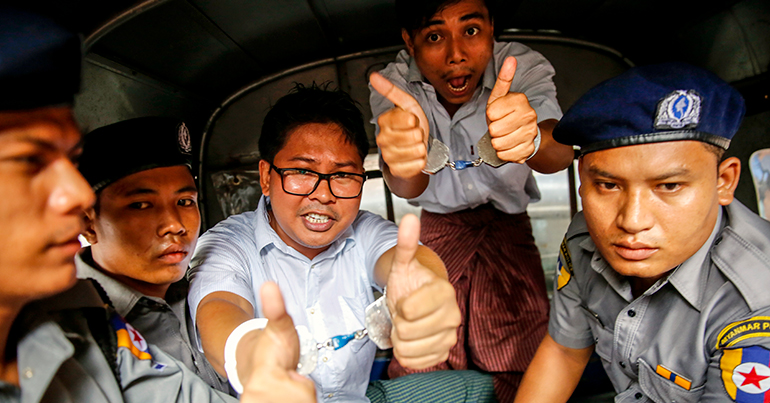With a smile, two thumbs up and a wholehearted wave for their onlookers, detained Reuters journalists Wa Lone,32, and Kyaw Soe Oo, 28, entered a Myanmar court today to hear the verdict in their ongoing “state secrets” trial.
The two journalists, both Myanmar nationals, were detained in December last year during their investigation into a massacre of ten Rohingya men in a small village in the Rakhine state. They were arrested while carrying official documents given to them by police and charged under the Official Secrets Act, a British colonial-era law that has a maximum sentence of 14 years.
The reporters have repeatedly stated their innocence, insisting that they were set up and that their arrests were politically motivated. While testimony from a Myanmar police officer corroborated the reporters’ account that they had been framed, the testifying police officer has since been sentenced to an undisclosed prison term for violating Myanmar’s Police Disciplinary Act.
The seven-year sentences were handed down despite calls for the reporters’ acquittal from press freedom advocates from the United Nations (UN), European Union, United States, Canada and Australia. Dozens of activists and journalists marched in Yangon yesterday in support of the duo.
“Today is a sad day for Myanmar, Reuters journalists Wa Lone and Kyaw Soe Oo, and press freedom anywhere,” Reuters editor-in-chief Stephen Adler said following the verdict.
An official statement released by the Human Rights Watch (HRW) condemned the conviction as a major setback for freedom and stated that the sentence is directly linked to increasing military rule in Myanmar under Nobel Peace Prize winner Aung San Suu Kyi’s leadership.
“The outrageous convictions of the Reuters journalists show Myanmar courts’ willingness to muzzle those reporting on military atrocities,” said Brad Adams, Asia Director at HRW. “These sentences mark a new low for press freedom and further backsliding on rights under Aung San Suu Kyi’s government.”
He added that the government should abandon the court’s verdicts and release the two journalists immediately.
“These convictions won’t hide the horrors against the Rohingya from the world – they merely reveal the precarious state of free speech in the country and the urgent need for international action to free these journalists,” Adams said.
The ruling comes at a time of mounting international criticism of the Myanmar military’s human rights abuses against the state’s Rohingya Muslim minority. Last week, the UN released a report that called for Myanmar army generals to be investigated for “gross human rights violations and serious violations of international humanitarian law”. The report was rejected by the Myanmar government, which continues to deny extensive evidence of atrocities and refuse to allow independent investigators into the region.


